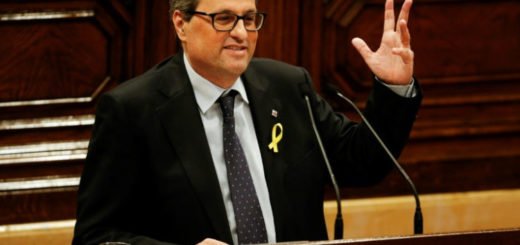Firebrand Shia Cleric Moqtada al-Sadr Close to Form Government in Iraq
The Iraqi firebrand cleric Moqtada al-Sadr will begin talks to form a government after winning more seats than the prime minister in a national election that has made him an unlikely kingmaker.
Sadr’s strong showing in Saturday’s election moves him from the fringes of Iraq’s political life to the messy centre stage and appears to give him a strong say on who will lead the country.
The Shia cleric ran on a nationalist platform and has been avowedly anti-US since he led a militia that played a leading role in the civil war and the fight against the American occupation in the years after the invasion that ousted Saddam Hussein.
He has also been a fervent critic of Iran’s role in Iraq, putting him at odds with significant parts of the political establishment.
Washington’s preferred candidate, the incumbent prime minister, Haider al-Abadi, appears to have come third in the vote, trailing both Sadr and Hadi al-Ameri, the Iranian-backed leader of Shia militia groups who helped the national military defeat Islamic State.
Final results due late on Wednesday could alter the landscape, but Sadr remains highly likely to have secured more seats than anyone else – an extraordinary result for a figure who had been seen by many outside Iraq as unsavoury and hostile, and by politicians in Iraq as a spoiler candidate.
Sadr’s win was delivered by a loyal base among Iraq’s Shia working class. He won the vote in Baghdad by a large margin, helped by a high turnout in Sadr City. Voters largely stayed home in the rest of the Iraqi capital, contributing to a historically low turnout overall, fed by a waning confidence in the country’s politicians.
Assembling a government is likely to take many months, with a coalition of at least 165 seats needed. Alliances that were formed before the vote are unlikely to hold, and it remains possible that Abadi could be appointed for a second term with Sadr’s support. Both blocs campaigned on nationalist lines and are wary of Iranian influence.
Iran’s interests are rooted in Ameri and the former prime minister Nouri al-Maliki, who appears likely likely to have won 25 seats – enough of a presence to demand a stake in the government.
Before the election, Ali Akbar Velayati, a senior adviser to Iran’s supreme leader, Ayatollah Ali Khamenei, said: “We will not allow liberals and communists to govern Iraq.”
Sadr had formed an alliance with the Communist party – another sign that his politics have become more pragmatic in recent years – and campaigned heavily on re-enfranchising Sunnis in Iraqi public life.
Saudi Arabia, long at odds with Iraq during the post-Saddam years, invited Sadr to Riyadh this year where the Saudi crown prince, Mohammed bin Salman, praised his stance on Iran.
After the election results, which western observers initially thought favoured Abadi, a senior diplomat said the antisectarian rhetoric that preceded the poll would be put to the test during the horse-trading period.
“If the bridge between Iraqi Arab Shia and Iran is greater than the bridge between Iraqi Arab Shia and Sunnis, then that could mark the end. The street has far more influence now than it did before and part of that is because it is fed up with everything and everyone.”
Sadr’s nationalist credentials have not been tested in any of the areas that remain critical to the country’s future – diversifying the economy, curbing corruption and boosting services. His skill in assembling a political coalition are also an unknown quantity. Abadi looms as an easier fit than Ameri, a fact that could kickstart negotiations.
The coalition assembly will be a crucial battleground in a confrontation between Iran and Washington, which has been heightened by Donald Trump’s decision to pull the US out of the nuclear deal.
Read: Record abstention in Iraq’s first vote after defeating IS
Source: The Guardian, Middle East monitor Md. Irfan Ansari The Kootneeti Middle East Monitor


















